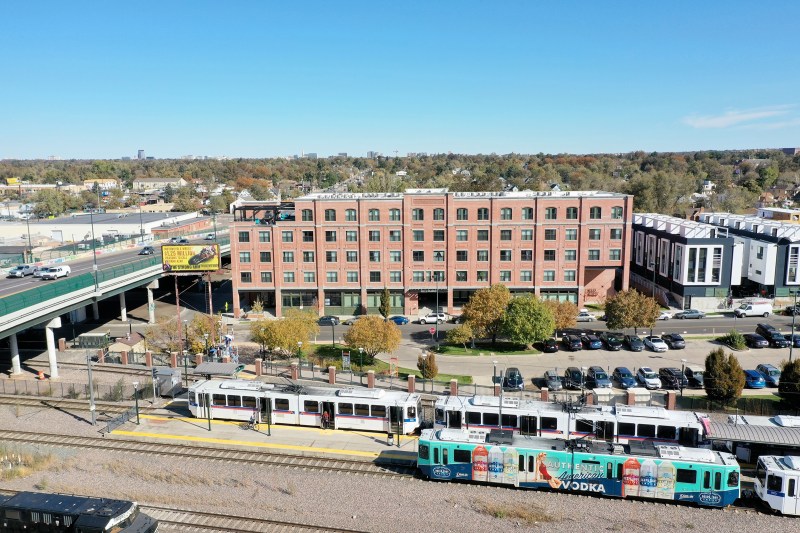It’s Time for Equitable Transit Oriented Development

As Executive Director, Deyanira Zavala leads the development and implementation of Mile High Connects’ strategic direction. She is responsible for fundraising and relationship management to advance the Mile High Connects collective priorities. Prior to joining Mile High Connects, Deyanira dedicated her career to supporting aspiring Black, Latinx and immigrant entrepreneurs in Colorado and Texas as a pathway to community asset & wealth building.
When the Mile High Connects (MHC) coalition was formed in 2011, our region’s low-wealth communities were reeling from the aftermath of the 2008 recession just as the first lines of the FasTracks expansion were being laid. Our mission was bold – to preserve opportunity for all near transit. Transit oriented development (TOD) – high density near transit stations – was our primary tool. While we were successful in preserving some affordability, over the years, TOD became more common, increasingly catering to a changing, more affluent population.
Today, our region is facing an economic crisis of a different kind. Affordable housing has become unattainable just as low-wealth residents need better and faster access to critical services near transit. Recovery from this economic crisis will require us to use our traditional tools with an eye towards their impact on vulnerable communities as we search for an equitable recovery from COVID-19.
Now is the time for the Denver region to embrace equitable transit oriented development (eTOD). eTOD ensures that development near transit serves the users of public transit – our essential workers, our transit dependent, and low income riders. This eye towards equity safeguards development as a benefit for all people. We know housing and transportation rank as the two largest costs in a typical household budget. Recent research conducted by RTD confirms locally what national research has long suggested: transit-oriented affordable housing is transit-supportive land use. To maintain and grow ridership, RTD should put policies in place that promote affordable housing on RTD property.
MHC has been following the work of RTD staff & the proposed Equitable Transit-Oriented Development Policy for Metro Denver. This policy change was first presented to the RTD Board’s Planning/Capital Programs & FasTrack Committee in August 2020, breaking down ridership research among low-income households transit ridership and tools available in the eTOD toolbox to encourage the development of affordable housing on RTD land. In October 2020, the Board dove into the potential policy elements and compared RTD’s existing policy to that of peer agencies. Recognizing the benefit that affordable housing provides to transit service and vice versa, the proposed policy includes:
- Affordability: RTD would strive to reserve 35 percent of housing for low-income households, as defined by funding sources like the federal low-income housing tax credit program, which today supports Denver households earning up to $60,000 for a family of four (on portfolio average over 10 years).
- Parking Replacement: RTD would require a developer to replace some – but not all – parking lost to redevelopment, based on a forecast of future parking demand (as it did before leasing parking in the Sheridan Station Garage to support adjacent affordable housing).
- Shared Parking: RTD would look for opportunities to share parking between transit users and residents. A forthcoming RTD report found that residents of transit-oriented affordable housing use only 0.36 parking spaces per unit at peak demand. This is supported by national research that low-income station-area residents are disproportionately impacted and more likely to travel by transit. Developing park-and-ride surface lots for affordable housing benefits residents and transit agencies alike.
- Expedited Administration: RTD would consider waiving development review fees, minimizing review times, and entitling agency property to attract affordable-housing developers and reduce development uncertainty, costs, and schedules.
- Negotiated Land Price: RTD would consider discounting land value for affordable housing in exchange for a commensurate amount of station-area improvements or other contributions. While RTD must work within the constraints of State law, which requires RTD to receive appraised fair market value, the governor-appointed RTD Accountability Committee is actively discussing the limitations of these constraints and what can be done to address these challenges.
This policy builds on national models. Regional transit agencies serving Seattle, the Bay Area, Silicon Valley, and Los Angeles have established policies to encourage affordable housing on agency property. Washington state law requires that 80 percent of appropriate surplus property serve affordable housing, while peer agencies in California aspire to commit 35 percent of housing to low-income households.
The timing of this policy couldn’t be better for Denver. The governor-appointed RTD Accountability Committee is actively moving forward on a draft set of recommendations and is striving to make impactful changes. RTD’s new leader, General Manager and CEO Debra Johnson, has expressed a willingness to be bold in her leadership, focusing RTD’s efforts on achieving its mandate to benefit the region. And federal support for transit-supportive transportation and housing policies may quickly follow President-elect Biden’s inauguration.
RTD has much to gain from the increase of equitable transit-oriented affordable housing in Metro Denver. Its leadership would position the agency and the region for a more financially and equitably sustainable future. On Wednesday, 12/2, join us for Transit is the Future: Denver Transit Justice Forum. The discussion will touch on transit’s critical role in a sustainable economic recovery and the important role decision makers — such as the RTD Board, CDOT, the City of Denver, and others — play in meeting the moment to ensure we aren’t falling back into our car-centric ways. Register for the event below. In the meantime, we encourage the RTD Board of Directors to vote soon to approve the Policy and ensure the timeliness of the discussion is not lost on our region.
Share this link with a friend who should get daily walking, biking, and transit news.


